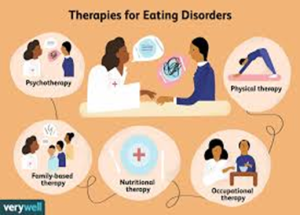Getting to The Root of Eating Disorders: The Growing Issue of Food Disordered Issues
Awareness about eating disorders and psychology in society has led to have open, honest and balanced talks about food but most importantly it has opened the floor to people who have suffered in silence and struggled with food. Despite most of us associating eating with pleasure, sustenance and cultural ritual, for other people it can become an experience filled with anxiety, guilt, and emotional turmoil. Eating illnesses affect people, physically as well as mentally, and if left untreated, their consequences can be enduring.
Essentially, What Are Food Disorders?
At their core, food disorders are mental health issues, resulting in an unhealthy relationship to food and eating. These are often related to emotional, mental, and environmental factors. People experiencing food disorders might overeat, or may not be eating enough, and could express extreme behaviors .It is important to differentiate food disorders from occasional overeating or dieting, which are normal for many people.
Various Food Disorders
Understanding the different types of eating disorders is an important first step in identifying them in ourselves or in others. Here are a few of the more common ones:
Anorexia Nervosa: People with anorexia are extremely afraid of gaining weight. Most never believe they are thin enough, regardless of how underweight they become. As a result, they may dangerously limit their consumption of food, workout to the point of working out to death, or use other unhealthy means of weight loss.
Bulimia Nervosa: Bulimia Nervosa: Bulimia is the recurrent consumption of a large amount of food in a short period of time, with compensatory behaviors such as: vomiting, laxative abuse, and/or exercise to compensate for binge behaviors and/or avoid weight gain. Unlike anorexia, those with bulimia may be of normal weight, allowing it to go unnoticed more easily
Binge Eating Disorder (BED): The popular food disorder is the BED. They are eating food quickly and they feel like it is out of their own control. They are also usually free from the compensatory behaviors done by those with bulimia, like vomiting. This disorder often results in overweight & obesity and their related issues like diabetes, high BP etc.
Avoidant/Restrictive Food Intake Disorder (ARFID): This condition, previously called selective eating disorder, is not typical picky eating. This may involve the avoidance of specific foods or food groups due to their texture, texture or fear of choking or vomiting. This may lead to malnutrition, weight loss, growth problems, particularly for children.
Other Specified Feeding or Eating Disorders (OSFED): This diagnosis applies when a patient has signs of an eating disorder but not all of the signs for a particular eating disorder like anorexia, bulimia or BED. OSFED includes several severe forms of disordered eating that do not meet the complete diagnostic criteria for any of the other disorders.
What Causes Food Disorders?
There’s no single cause of food disorders. They generally arise due to a variety of causes:
Genetics: Family history of food disorders or other mental health problems can be a factor.
Psychological: Psychological factors, such as low self-esteem, perfectionism, anxiety or depression can factor in.
Societal pressure: There may be unrealistic body standards as a result of media and society.
Trauma: Current or past experiences with being bullied, abused or with major life changes.
Treatments For Food Addictions

The hopeful reality is though, is that food & eating disorders and psychology are related and psychology can help to overcome disorders. There are a number of treatments, it all depends on the type of disorder and the individual case.
Medical Support: A physician or registered dietitian can oversee weight, nutritional status, and overall health. Some might need to be stabilized in hospital in more severe cases.
Cognitive Behavioral Therapy (CBT): which can teach people to recognize unhealthy thought patterns about food and eating. Other treatments such as Dialectical Behaviour therapy (DBT) or family based therapy can be very effective as well.
Nutrition Counseling: Registered dietitians develop individualized nutrition plans, help manage fear of food, and avoid chronically dieting. The aim is for them to develop a healthy relationship with food.
Pharmaceuticals: Sometimes drugs are used to treat mental health comorbidities of abuse, such as depressive or anxiety disorders. But, medication is not a cure and should be supplemented with therapy and counseling.
Support Groups: Being around other people who know what you’re experiencing can be a great support and lessen feelings of isolation. Online or in person, support groups can be an essential component of recovery.
In Conclusion
Food disorders and psychology goes hand in hand . They are more than habits in eating; they are a part of emotions, self image and psyche. Identifying the types of food disorder and knowledge about treatments, are necessary for prompting individuals to seek appropriate support, and to seek help at the correct time.
“Knowing more about the range of food disorders and treatments is important for allowing people to go seek the help they need at the right time.
